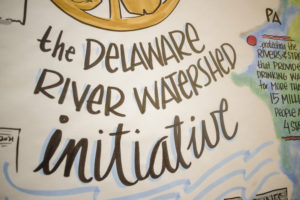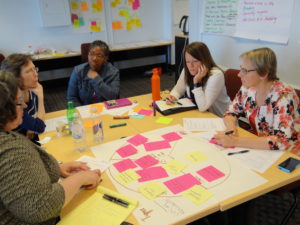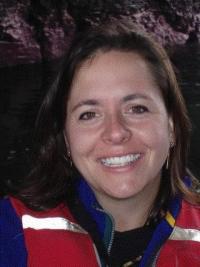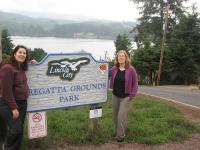Inspiring Collaboration
[accordion-wrap][accordion title=”The Complexity Experts: Going Big for Clean Water”]

The Delaware River Watershed Initiative
In 2014, the William Penn Foundation in Philadelphia launched the Delaware River Watershed Initiative, one of North America’s most ambitious projects to protect and restore an entire watershed.
Fifteen million people rely on the watershed for drinking water. Its purity depends on the ecological health of the landscape – forests, farms, suburban and urban areas – and the rivers that flow through it.
Since initiating the project, the foundation has recruited more than 50 nonprofits to participate, including land trusts, nature centers, academic institutions and advocacy groups. It’s a complex web of relationships designed to address a really complex problem.
In order to manage all that complexity, they recruited a longtime partner, the Institute for Conservation Leadership, to help organize and facilitate the network.
“Because we were so focused on getting the science right, we neglected to think about how fifty organizations could best work together on an initiative of this scale,” says Andrew Johnson, Program Director at the William Penn Foundation. “ICL was instrumental in fostering collaboration among our partners. This initiative is both ambitious and innovative, and in many ways we’re flying the plane while we’re building it. With ICL’s help, we’re flying it a lot better.”
“We’ve catalyzed an enormous amount of activity,” said Peter Howell of Open Space Institute, one of the leadership groups in the network. “Collectively, we’re doing more and we’re moving faster than any group could have done individually.
“ICL’s role has been essential,” he adds. “They highlight the ‘how’ of our work, not just the ‘what.’ Ultimately, that’s just as important.”
This is the alchemy of collaboration. When we focus on strengthening the network – better communication, clear structure, developing new leaders – all that collaborative energy pays off. “Small organizations value being part of something bigger,” says Johnson, “and that only works for us due to ICL’s mediation and facilitation.”
With the Delaware River project – essentially a big network comprised of smaller networks – we’re using every tool in our toolbox, including consulting, training, coaching, research, and meeting facilitation skills.
“ICL understands organizational tissue,” says Howell. “Our nonprofit provides the conservation content; they provide coordination and collaboration services. They’re the mortar between the bricks, holding the whole project together.”
“ICL was uniquely suited for this work in the Delaware River Watershed Initiative, no question. It was obvious to us that we needed an organization that had the expertise drawn from their work across the country. We needed their bandwidth and their ability to put people first in the system. They have been, in short, the bow that tied this bold water quality initiative together.”
Andy Johnson, William Penn Foundation
[/accordion][/accordion-wrap]
[accordion-wrap][accordion title=”A Green Vision for the Future”]
Green Vision 2025 – Chicago Wilderness
For 25 years, Chicago Wilderness has brought together over 250 organizations in diverse sectors like conservation, business, science, and health. With a shared vision of leading strategy to ensure a more resilient region, this collaborative works to preserve, improve, and expand nature and quality of life. Encompassing groups and leaders from Illinois, Wisconsin, Indiana, and Michigan, this enormous alliance struggled with conveying to funders what they do–an issue you may be familiar with if you’ve ever worked as part of a large collaborative.
Starting in early 2021 Chicago Wilderness began working with ICL to support the development of their seven goals, as well as integration across the network. As a very complex volunteer-driven collaboration, they were of course impacted by COVID. Elizabeth Kessler, Chair of Chicago Wilderness, knew ICL had the capacity and talent to help.
“COVID impacted our work to connect with each other and effectively communicate across group goals. ICL helped convene us all on Zoom and introduced us to many tools we weren’t familiar with. We owe it to ICL for helping us shape a Green Vision for the region. They helped us change our culture to be inclusive and engaging, and we spent more time on building understanding, comfort, and empowerment among our members. ICL’s work with us pulled us together as a network.” said Elizabeth Kessler.
“Chicago Wilderness needed support to move forward with a Green Vision that unified our seven larger goals. ICL’s specialty in working across sectors and boundaries to create positive change made an impact on the alliance. ICL helped us keep focus and supported our team in strategy development for our planning efforts and in communicating our deliverables to our funders. ICL is well known in the conservation community so they brought credibility to the process that would have taken much longer without them present.”
Elizabeth Kessler, Chicago Wilderness
In the first half of 2022, Chicago Wilderness will be formally launching its Green Vision. The goals create a comprehensive and collaborative strategy. This graphic illustrates those goals and a powerful alliance across NE Illinois, NW Indiana, and SE Wisconsin.
[/accordion][/accordion-wrap]
Building Organizations
[accordion-wrap][accordion title=”Creating a Shared Vision Across Organizations”]
 National Heritage Areas
National Heritage Areas
Maybe you’ve noticed those brown signs as you travel the interstate highway system telling you about entering a National Heritage Area or Corridor? These special places are where historic, cultural, and natural resources combine to form a nationally important landscape. Designated and supported by the National Park Service, National Heritage Areas depend on local groups for their programming, development resources, and public engagement.
In 2017, ICL was invited to convene National Heritage Area groups in Yuma, Chicago, and Philadelphia to explore ways to proactively build partnerships, generate innovative ideas for engaging local communities, and become more resilient, connected, and sustainable for the work ahead.
Dan Rice, President of the Ohio and Erie Canalway, reflected, “The reason we selected ICL is because they are really the leaders in nonprofit technical assistance regarding organizational development, leadership development, and capacity building. They know the best practices out there in the environmental nonprofit field. They do an excellent job of listening.”
Dan emphasized that ICL’s customized approach is what deepened the impact of the trainings. “We work with a lot of consultants, and there is a tendency for them to take the cookie cutter approach. ICL took into account the existing cultures, what was working well within the organization, and what wasn’t. They did it very effectively. They were excellent in person trainings with a lot of engagement.”
“That’s one of the greatest strengths ICL brings: they bring a fresh perspective to each issue and each project they work on and they are very diligent about listening to the client.”
Dan reflects fondly on his other experiences with ICL, including leadership training. “There are still principals from that training that I apply in my work. Much of my success I’ve had as an executive in my organization is due to the great training and skills that ICL has shared with me and I have in turn shared with others. I owe a lot of my success to ICL.”
[/accordion][/accordion-wrap]
[accordion-wrap][accordion title=”Increasing Effectiveness”]
 Gulf Restoration Network
Gulf Restoration Network
Cynthia, Executive Director of the Gulf Restoration Network (GRN) in New Orleans, LA, is no stranger to crisis. When the BP oil spill hit the Gulf in 2010, Cynthia and her organization were ready for action.
“Sadly, Hurricane Katrina prepared us for this,” she says. “We had already ramped up our monitoring capability and advocacy roles.”
Now, GRN is a central player in independently monitoring the release of oil and the clean-up efforts. “We have been out there since day one,” says Cynthia, as they work to try to determine the impact of the spill and the efficacy of the clean-up work that is being done. GRN is also urging congressional action to increase regulation and change the way the oil and gas industry do business.
Prior to being an Executive Director, Cynthia was a Campaign Director with experience as a litigator. She led successful campaigns to reduce wetlands losses in Louisiana and Mississippi and force EPA to start addressing the Dead Zone in the Gulf of Mexico. “When I transitioned to being an executive director, it was clear to me that I didn’t have the training,” said Cynthia. “I was an advocate, an activist.”
That was when a colleague from the Environmental Support Center recommended ICL’s Executive Director Leadership Program. “I learned what I needed to do as an Executive Director, and I learned that running an organization is like running a business,” says Cynthia. She followed the advice she got at ICL, and “because of that, Gulf Restoration Network is pretty effective.” Indeed, under her tenure, the organization has grown from 2 people to 14. She has relied on ICL not only for her own professional development, but she also sends her staff to ICL’s other leadership development programs.
Cynthia points out that in order for environmental organizations to be effective, their leaders must be “very focused on the health of the organization itself, even if that means sometimes sacrificing my time for the issue work that is the love of my life. I understand that that is my role. ICL taught me that.”
[/accordion][/accordion-wrap]
Developing Leaders
[accordion-wrap][accordion title=”Keeping Leaders in the Movement”]

Tonya Graham, Geos Institute
Tonya Graham, Executive Director of Geos Institue in Ashland, OR, is an energetic and committed leader in a field that is trying to solve the world’s most immense and intractable environmental dilemma – global climate change. At the Geos Institute, Tonya has developed an innovative way to bring the issue home: helping local communities prepare for climate change.
The Geos Institute provides research and advocacy on climate change, and works to protect the temperate rainforests that are a key part of our planet’s ability to sequester carbon.
“I came into contact with ICL when I was a brand new Executive Director,” recalls Tonya.
She was recognized for her raw talent for development, after starting her career as a volunteer hanging posters around town. Then, she became an Executive Director, with responsibilities that include fundraising, but also managing personnel, strategic planning, financial management, board relations.
“It was an incredible variety of tasks that I didn’t understand,” recalls Tonya. Leadership training with ICL helped Tonya realize that organizations go through natural life cycles, and there are different tools to address the challenges at each stage.
“It gave me concrete information and knowledge about the various aspects of being an executive director,” says Tonya. “If I had to stumble through that on my own, I would probably not be an Executive Director today or even have stayed in the conservation field.”
Now, Tonya feels at ease in her role as she expands programs and works directly with communities on climate change issues. She has eight ClimateWise® projects finished or underway, working on the tough issues of adjusting to a changing climate – managing water for fish, communities and farmers, adapting to new flood cycles, and reducing greenhouse gas pollution. At the same time, The Geos Institute is working on managing forests to sequester more carbon, especially in temperate rainforests.
“The experience with ICL made me understand that all the struggles I was having as a new ED were the struggles that everybody goes through. And, now I have a way forward.”
[/accordion][/accordion-wrap]
[accordion-wrap][accordion title=”Leadership for Long Term Change”]
Kim Leval, Northwest Coalition for Alternatives to Pesticides
According to Kim Leval, Executive Director of Northwest Coalition for Alternatives to Pesticides (NCAP). “You have to be persistent, you have to be tenacious, and you can never stop.” She has seen first-hand how building relationships over the long-term can lead to major wins for the environment.
Previously, at the Center for Rural Affairs, Kim participated in a meeting convened by ICL to bring together a national group of crop, soil and agronomy scientists to meet with the sustainable agriculture community. The scientific associations had faced growing influence from corporate perspectives, with strong actors such as Monsanto and Cargill.
“By bringing the scientists together with the sustainable agriculture community, ICL created and strengthened an important democratic counter-balance to the voice of corporations,” says Kim. The dialogue sparked a whole new line of research and inquiry. “Ten years ago, most USDA research was focused on what kind of pesticide killed what kind of bug,” recalls Kim. “By bringing organic farmers into the dialogue and seeking alternatives, it made a big difference. Now, there is a national organic research program at USDA.”
Fast forward to Kim’s work today, and she is continuing her advocacy for alternatives to pesticides in the top leadership role at NCAP. Attending ICL’s Executive Director Leadership program was her board’s idea to ensure a smooth transition after the retirement of a 24-year long leader. Being able to reach out to other directors in the network, ask for advice, and gain insights from the ongoing coaching were invaluable to her in her first year at the helm. That year happened to be when the economic crisis hit in 2009. Her ICL coach helped her understand that the board would be looking to her for leadership. “ICL’s approach helped me strengthen my confidence and remember to trust my best instincts,” said Kim.
“ICL makes leaders more effective. That translates into more change for the environment.”
[/accordion][/accordion-wrap]

